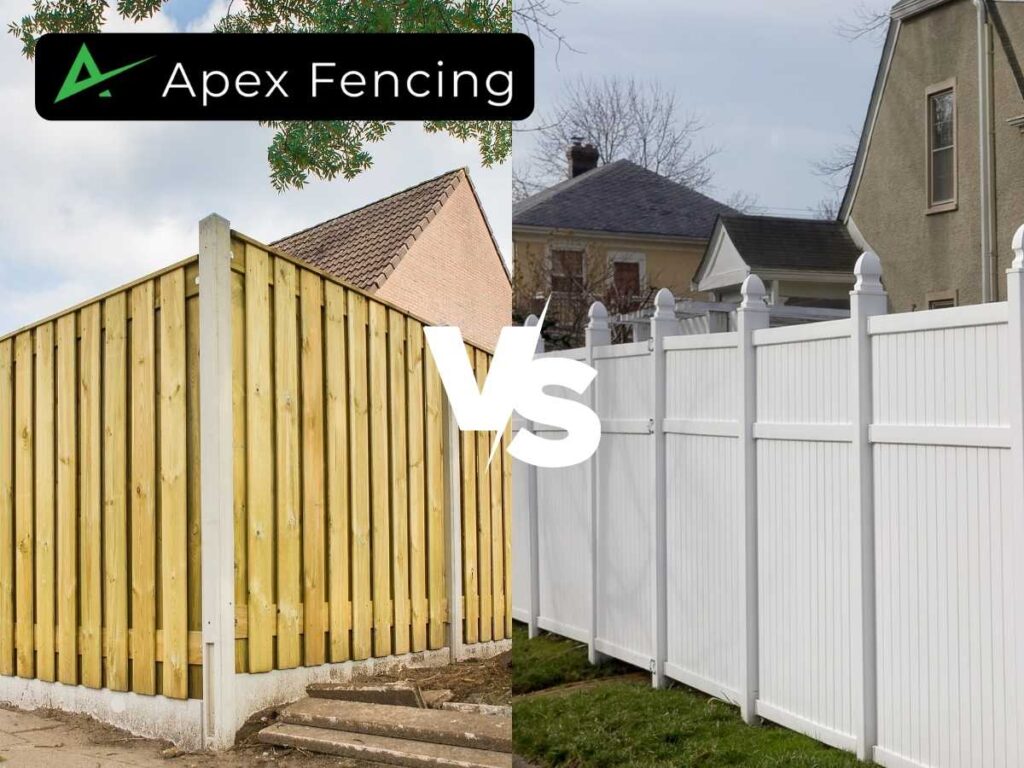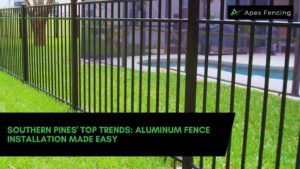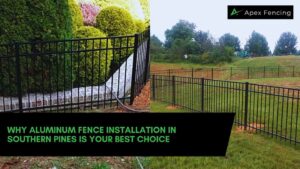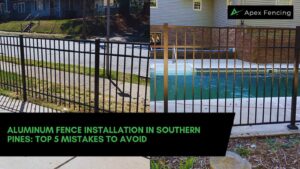Table of Contents
When it comes to choosing the right fencing material for your property, you have a lot of options. Wooden fences and vinyl fences are two popular choices that offer different benefits and drawbacks. To make sure you choose the best option for your needs, take some time to consider the pros and cons of both wooden and vinyl fences. Both materials offer great security, privacy, and looks when they are installed correctly by a trained professional. But there are also differences in how long they last, how much maintenance they need, how much they cost over time, how they affect the environment, and what safety features they have. Weighing these factors can help you decide which type is best for your home or business’s unique needs.
Definition of Fencing
Fencing is a structure, usually made of wood or metal, that serves as a physical barrier between two sections of land. It can be used for both residential and commercial purposes; such as providing privacy, adding security, containing animals, marking boundaries and landscaping. Fences come in various heights and styles to meet specific needs.
When discussing fencing terminology, it is important to note the different types of fences available. Chain link fences are one of the most common types of fence material used today; they offer excellent protection from intruders while also being cost-effective and easy to install. There are several other materials commonly used for fencing including vinyl, aluminum and wooden boards. Each type has its own advantages and disadvantages when choosing the best option for your property.
The installation process will vary depending on what type of fence you choose but all involve preparation work before beginning construction. The site must be cleared of any debris or vegetation and leveled if necessary. Posts must be dug into the ground at regular intervals along with fixtures for attaching the panels or boards together securely. Lastly, additional features like gates may need to be added during installation for ease of access across your property line. Careful consideration should go into each step of selecting and installing a fence so you have an attractive final product that meets your individual needs.
Differences Between Wood and Vinyl Fencing
When it comes to fencing, wooden fences and vinyl fences stand out as the two most popular options. While these materials have a lot in common, there are also some notable differences between them that should be considered when making your decision. From material composition and installation requirements to a cost comparison, here is an overview of what sets wood apart from vinyl fencing.
Material Difference: The first difference lies in their material composition. Wooden fencing is composed of organic or treated lumber, while vinyl fencing is made up of polyvinyl chloride (PVC). Both offer different benefits for property owners, but with regards to longevity, durability, and maintenance needs, PVC tends to fare better than wooden fences over time due to its weather-resistant properties.
Installation Requirements: Installation requirements can also vary significantly depending on which type of fence you choose. For instance, because wood requires hardware such as nails and screws for assembly, installation may require more tools and labor than a vinyl fence, which typically interlocks during the installation process.
Cost Comparison: Lastly, there’s the issue of cost comparison between wooden and vinyl fences. Generally speaking, wooden fences are often less expensive upfront; however they tend to involve higher costs associated with routine maintenance like staining/sealing compared to vinyl fencing which usually only requires occasional cleaning with soap and water solutions. Ultimately, this will depend largely on factors like size as well as overall quality so homeowners should weigh all these considerations before deciding what type of fence is right for their specific needs and budget.
Durability
Durability is a key factor to consider when weighing the pros and cons of wooden fences or vinyl fences for your property. For many homeowners, this means looking at how long each type will last in their specific environment.
Wooden fences are often praised for their longevity; however, without proper weatherproofing and termite-proofing treatments, they may start to rot quickly depending on the conditions in which they’re installed. When treated properly with oils or sealants that keep moisture out, wood can be an incredibly durable option that lasts 10-15 years.
Vinyl fencing is naturally more corrosion-resistant than wood and boasts a lifespan of 20+ years if it’s well-maintained. To ensure optimal durability and prevent fading from UV rays over time, it should be cleaned every few months with a mild detergent solution: 1. Hose down the fence regularly to remove dirt buildup. 2. Scrub any hard stains (i.e., bird droppings) with a soft brush and soapy water mixture. 3. Rinse thoroughly with clean water afterwards to minimize soap residue build up on the surface of the fence panels.
Depending on your climate zone, either material could make an ideal choice for your home—wood requires more maintenance but also brings unique character that’s hard to replicate with other materials like vinyl or metal fencing products, while vinyl offers superior resistance against environmental factors such as wind damage or ultraviolet light exposure without requiring much upkeep beyond occasional cleaning sessions once per season or two times annually at most.
Maintenance Requirements
According to a study by the American Fence Association on fence maintenance needs, wooden fencing requires more maintenance than vinyl fencing. Wooden fences may require staining or sealing every two to three years in order to properly weatherproof them and prevent warping, rotting, cracking, and splintering due to exposure from the elements. Vinyl fences are usually easier to take care of because they already have a color coating and UV protection built in. However, dirt can build up if they aren’t cleaned regularly. To keep up appearances for both materials, power washing or scrubbing down the surface of your fence should be done once a year.
Fence repair is another component of maintaining either type of material. With wood fence installation, broken boards need to be replaced immediately before any damage spreads further along the picket line. While vinyl provides durability and long lasting strength, strong winds can still cause minor chips and scratches, which will eventually lead to discoloration unless repaired quickly. When it comes to maintenance, you need to check on your fence often to make sure it works well and looks good.
No matter what kind of material you choose for your property’s fencing, preventive maintenance and repairs done on time are key to making sure it lasts and can handle bad weather. Whether you choose a wooden fence or a vinyl fence, investing in an annual service plan from certified professionals can help extend the life of your structure and make it look better in all four seasons.
Cost Considerations
When it comes to fencing installation and repair, cost is always a major factor. Wooden fences and vinyl fences can both fit within most budgets, depending on the size of the property and other pricing factors. A comparison of the costs of wood and vinyl fences shows that wooden fences may be cheaper up front, but they need to be maintained often in order to keep working. Vinyl fences, while initially more expensive than wood, often last longer because they don’t need as much maintenance or repairs over time.
A general price range for installing either type of fence will depend on several variables, such as material choice, height requirements, and geographical location. Installation fees also depend on how complex the job is – if there are any obstacles like sloped terrain or large trees that have to be worked around – so having an experienced professional handle the job is recommended.
For those looking to save money when budgeting tips for their fencing project, purchasing raw materials directly from a supplier might reduce costs significantly compared with buying pre-made fence panels or posts at retail stores. Additionally, DIY assembly options are available for basic installations; however, this should only be attempted by individuals with adequate experience handling tools and building projects safely.
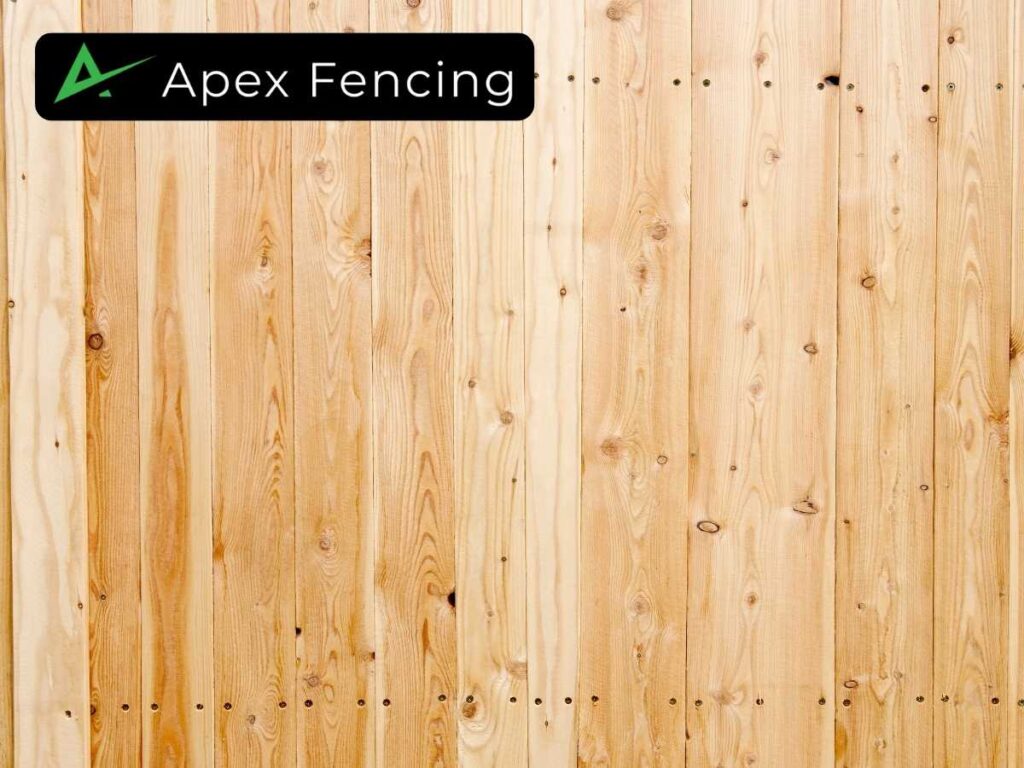
Effect on Property Value
Fences have been a symbol of demarcation since time immemorial. They are more than just markers, though – they can also be an integral part of enhancing the value of your property. When it comes to deciding between wooden fences or vinyl fences for improving the value of your house and land, there is no one-size-fits-all answer; each option has its own pros and cons that must be weighed accordingly.
The effect on property value depends greatly on the type of fencing material you choose. Wooden fences provide a classic look with their timeless aesthetic appeal while vinyl fences often offer more stability and durability due to their strength and weather resistance properties. Both materials will add some monetary worth to your home should you decide to sell in future but here are some factors to consider:
Value Increase Fencing
Although both types of fence can increase the overall value of your property if done right, research shows that vinyl fencing tends to yield higher returns in terms of resale values compared to wood because potential buyers appreciate its low maintenance requirements and extended life expectancy.
Durability & Maintenance Costs
Wooden fences tend to require more frequent maintenance due to warping caused by moisture exposure whereas vinyl fencing needs little upkeep over time which makes them ideal for busy homeowners who don't have much spare time for regular repairs or replacements.
Lifespan & Cost Effectiveness
Vinyl has a longer lifespan compared to wood so it may not need replacing as often which makes it cost effective in the long run whereas wood requires occasional replacement depending upon how well maintained it is kept over time.
Aesthetic Appeal
Depending upon the style, color, shape and other factors, both vinyl and wooden fences can significantly enhance the visual beauty of any landscape when installed correctly.
In short, choosing between these two options largely depends upon individual preferences such as budget constraints, desired aesthetics, and whether you plan on staying in this particular home for years into the future or selling soon after installation/renovation work is completed. In the end, if you carefully consider all of these pros and cons before making a decision, you can make sure that whatever type of fence you choose will add the most value to your property’s marketability, both in terms of tangible financial gain and the intangible emotional satisfaction that comes from living in a beautiful place where you don’t have to worry about making expensive changes in the future.
Weight of Materials
When considering the weight of materials for a fence, wood and vinyl each have their own benefits. Both are durable options that can last many years with minimal maintenance; however, when comparing fencing material weights, there is an important distinction between them. Wood fences tend to be heavier than their vinyl counterparts due in part to their composition. On average, wooden fences weigh more than twice as much per square foot compared to vinyl ones. This means that if you plan on installing a large amount of fencing around your property, it may be worth taking into consideration the extra strain this could cause on posts or other supports needed for installation.
Vinyl has another advantage in regards to its weight – since it tends to be lighter and less dense, it’s easier to transport from one job site to another without having to worry about additional costs associated with moving bulky materials such as lumber. Also, it usually costs less to put up than a traditional wooden fence because it takes less time and less people to do it.
The type of material used will ultimately depend upon individual needs and preferences but both wood and vinyl offer reliable solutions in terms of strength and durability while weighing different amounts depending on the size and scope of the project at hand. Before choosing a type of fence, you should always know how much material you need.
Aesthetic Appeal
The aesthetic appeal of a fence is an important factor to consider when deciding whether to install wooden fences or vinyl fences. Wooden fences have a classic, rustic charm that adds character and warmth to any property. They often feature historic designs with intricate patterns, lending them a unique look. Vinyl fences, on the other hand, offer a modern feel that can give your home a contemporary style.
Wooden Fences: – Offer traditional looks with rustic charm – Can be stained for added color options – Are easy to customize for unique styles – May require periodic maintenance such as staining and repairs – Are typically more expensive than vinyl fences due to labor costs
Vinyl Fences: – Provide an efficient solution for properties requiring uniformity in design and installation time – Come in various colors without having to stain it yourself – Do not need periodic maintenance such as staining and repairs like wood does – Require less material compared to wood making it more cost effective over time – Have fewer customization options compared to wood
Both types of fencing materials come with advantages and disadvantages depending on the homeowner’s needs. However, one thing remains certain; both wooden fences and vinyl fences provide timeless beauty that will add value to any property while maintaining its own unique characteristics.
Security Features
When it comes to weighing the pros and cons of wooden fences or vinyl fences, security features should be at the top of any homeowner’s list. With a wide selection of options to choose from, each type of fence offers unique added protection in terms of anti-climbing, anti-sabotage, and anti-theft measures.
Wooden fences are a good choice because they naturally blend in with the surrounding landscape and give homeowners some privacy. Additionally, they provide more flexibility when it comes to customization due to their sturdier construction which allows them to be built higher than vinyl alternatives. Also, they can be easily made stronger by adding things like barbed wire or spikes to the top part, which makes it taller. The disadvantage, however, is that wood is susceptible to damage over time, making maintenance an ongoing issue.
Vinyl fencing has come a long way since it was first made as a reliable alternative to wooden fences. Vinyl doesn’t need as much maintenance as wood and can resist things like cracking and fading that happen when it gets wet or cold. In addition, its strength makes it difficult for intruders to climb over or tamper with posts or panels. While generally lower cost than wooden fences, one downside associated with this material is its limited design options – meaning there may not be enough variety available for customizing a certain look desired by the owner.
Given these facts about security features offered by both types of fencing, property owners should weigh all factors before deciding which option best suits their individual needs and budget requirements – ultimately helping them protect their home and loved ones while maintaining attractive appearance standards around their residence perimeter .
Ease of Installation
When considering the ease of installation for a fence, both wooden and vinyl fences have distinct advantages. Installing a vinyl fence takes less time and effort than putting up a wooden fence, which is a more complicated process. The materials used in constructing a vinyl fence are typically lightweight, making it easier to assemble and install than its heavier wood counterparts. Furthermore, many vinyl fence kits come with pre-assembled panels that allow for easy installation.
On the other hand, while wooden fences may take longer to complete due to their heavier construction material and need for posts to be dug into the ground, they offer greater flexibility when adapting them to sloped or otherwise challenging terrain. Wooden fencing also offers more options in terms of customization based on individual preferences as they can be painted or stained after installation. Additionally, if repairs are needed over time, those can often be done easily without having to replace entire sections like would be necessary with vinyl fencing.
Overall, each type of fencing has unique benefits depending on what is most important for individuals looking to install a fence around their property. Those who want quick and easy installation should consider a vinyl option whereas those seeking long term durability might opt for a wooden fence instead.
Customization Options
Having discussed the relative ease of installation for wooden fences and vinyl fences, it is now important to consider customization options available for each type. Vinyl fencing comes in a variety of colors and styles that allow homeowners to choose an aesthetic that fits with their home’s exterior. There are also numerous fence design options from traditional picket designs to more modern privacy panels or semi-privacy designs. Furthermore, there are many accessories available such as post caps and finials which can be used to add a unique touch of character to any vinyl fence installation.
Wooden fences offer even more flexibility when it comes to customization. Wood provides greater opportunities in terms of color variation due to the ability to stain or paint different shades on wood surfaces. Homeowners can also choose from several distinct wood fence styles like board-on-board, lattice top, basket weave, shadow box, and stockade depending on their desired look. Additionally, they have access to a wide range of accessories including various gate hardware pieces and decorative elements like trellises and arbors which can give a yard extra personality.
In short, both wooden fences and vinyl fences provide plenty of possibilities when it comes to customizing your outdoor space according to one’s individual preferences. Whether you’re looking for low maintenance with vinyl fencing or want something more stylistically diverse with wood fencing – there are options out there that will meet your needs without breaking the bank.
Fire Resistance
The importance of fire resistance when selecting a type of fence for your property should not be overlooked. Fences are often installed near homes and other structures, which can create a risk if they’re vulnerable to catching on fire. Wooden fences have the potential to be combustible while vinyl fences offer more protection from flames due to their non-combustible material.
When it comes to wooden fences, there are options available that provide some level of flame retardant protection through special treatments or coatings applied during production. However, these treated wood materials may still burn slowly in high heat environments like wildfires, so this is something homeowners should consider before installation.
Vinyl fencing offers superior fireproofing capabilities as compared to traditional wood fences because its primary component, PVC (polyvinyl chloride), is inherently flame-retardant and does not contribute fuel for combustion unlike untreated wood products. Additionally, many vinyl fence manufacturers add additional fire resistant chemicals into their formulas making them even more effective at resisting flames than standard PVC alone would allow. Ultimately, when safety and security are paramount considerations in selecting a fencing material around your home or business, vinyl fencing with enhanced fire-resistant formulations provides an excellent option.
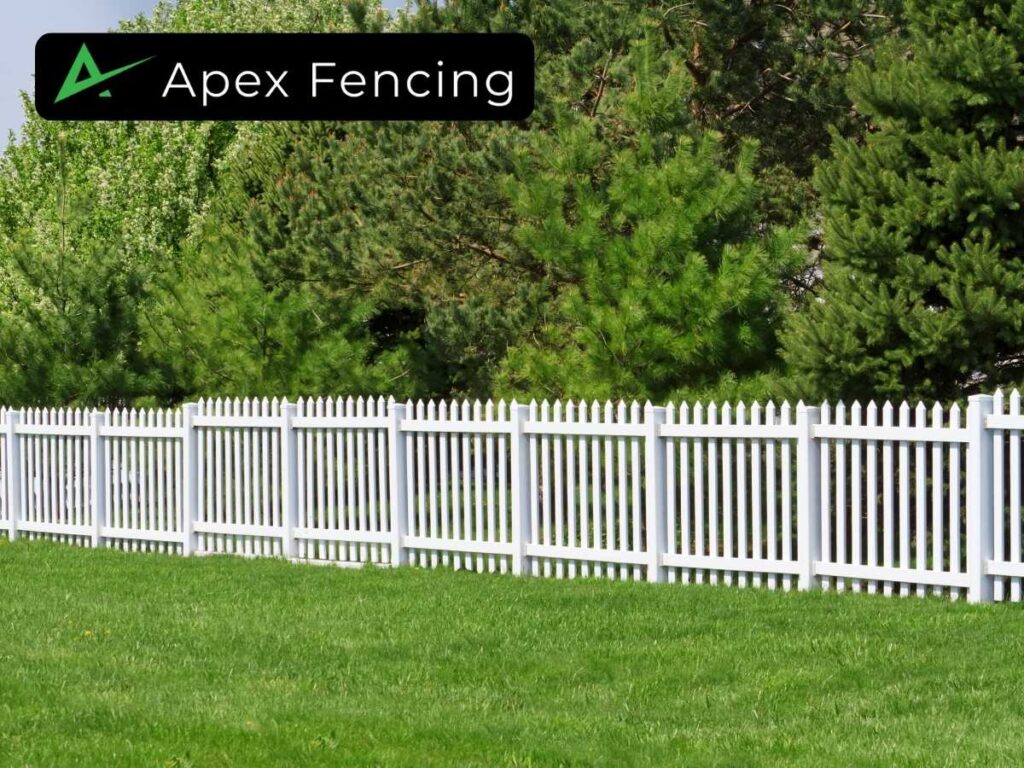
Permits and Regulations
Before choosing and installing a fence, it is important to consider the various permits, regulations, local ordinances, codes and compliance that may be required by your municipality. This can vary depending on the type of fence you choose, such as wooden or vinyl fences. In some cases, even if no permit is required for installation, certain codes must still be met in order to ensure safety and structural integrity.
For instance, if the height of the fence exceeds six feet then additional permitting may be necessary. Similarly if fencing is being erected near property lines this could require special consideration with regards to zoning regulations. If any of these conditions are present prior to fence installation it is best to contact your local building department for guidance. It is also important to research whether there are any deed restrictions or neighborhood associations that might impact what type of fence you install or how high it can be built.
In addition to researching applicable laws it is essential to check with utilities companies like gas and electric before starting a project so as not disturb underground lines which would lead to costly repairs or delays in completion time. Ultimately due diligence in researching all relevant permits and regulations will make sure your proposed project meets all legal requirements while avoiding potential liability down the road from neighbors who disagree with the scope of work planned.
Warranties
“A stitch in time saves nine,” is an adage that aptly applies when deciding on a fence installation for your property. Before investing in any type of wood or vinyl fencing, it is important to understand the warranties associated with both materials.
When looking at product warranties, most wooden fences come with a manufacturer’s warranty between one and three years depending on the quality of lumber used. Vinyl fencing has longer warranties ranging from 10-50 years depending on the grade of material selected. Installation warranties are also important to consider; many companies will offer either a full or partial installation warranty usually with a duration of six months up to two years.
It is essential to research which company you will hire prior to making your decision as some installers may not provide any kind of warranty whatsoever while others might guarantee their workmanship for extended periods of time. Furthermore, it is wise to read through all terms and conditions carefully before signing off on anything so there are no surprises down the line if something should go wrong with your new fence.
Conclusion
Fencing is a great way to add privacy, security and value to any property. While both wooden fences and vinyl fences have their advantages, it is important to weigh the pros and cons of each before making a decision as to which type best suits your needs. Durability, maintenance requirements, cost considerations, customization options, fire resistance, permits and regulations and warranties should all be taken into account when choosing one over the other.
In terms of durability, wood can last anywhere from 15 to 25 years depending on its quality while vinyl tends to hold up for much longer. Wood requires regular staining or painting in order to protect it against weathering whereas vinyl does not need such treatment. Customization options are also more extensive with wood than with vinyl due to the fact that wood can be cut easily in order to fit certain shapes or sizes. Vinyl may also require additional permits or inspections in some jurisdictions so this should be checked before installation begins.
Apex Fencing offers both wood and vinyl fences with a variety of designs, sizes and colors to choose from around Asheboro NC. Our team of experienced technicians can give you advice on the best type of fence for your needs. They can also help you get the right permits and make sure you follow all the rules. With warranties ranging from one year up to 50 years, we offer peace of mind that your new fence will stand the test of time. Contact us today to get started on designing and installing the perfect fence for you!

